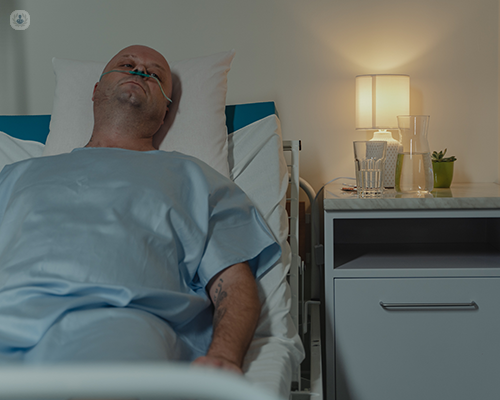Is metastatic colorectal cancer curable?
Written in association with:More than 40,000 people are diagnosed with colorectal cancer (of the colon or rectum) every year in the UK.
Here, Mr Nicola de’ Liguori-Carino, highly experienced consultant general surgeon, provides an expert insight into metastatic colorectal cancer, including detection, treatment options and prognosis, among other important points.

What parts of the body are affected by metastatic colorectal cancer?
Metastatic colorectal cancer can, unfortunately, affect several parts of the body. However, the most common by far is the liver, followed by the lungs.
How is liver metastasis from colorectal cancer detected?
Metastatic colorectal cancer to the liver is commonly detected with the help of a CT scan, which performs a scan of the body, usually during the diagnosis of the primary colorectal cancer.
About 20 per cent of all patients with colorectal cancer will have already developed liver metastasis at the time of the primary diagnosis. Another 50 per cent of patients will develop liver metastasis in the months or the year following the diagnosis of the primary tumour.
Even in these cases, metastasis to the liver is detected with a CT scan, or less commonly, with an MRI scan or with a PET scan.
What are the most effective treatment options? What do these treatments entail?
The most effective treatment for metastatic colorectal cancer to the liver is normally a combination of surgery and chemotherapy.
There isn’t an exact algorithm to determine when to give chemotherapy, when to give surgery, if one should be given before the other, or vice versa. What is known, however, is that the most effective option to cure metastatic colorectal cancer is to remove the metastasis in the liver with surgery, and then to add chemotherapy on top of that.
There are other forms of treatment for metastatic colorectal cancer, but these tend to be less successful and are usually reserved for cases where surgery is not an option. These treatment options may include radiotherapy or tumour ablation.
What side effects do these treatments have?
The side effects induced by chemotherapy are extremely different to the side effects related to surgery.
The side effects of chemotherapy are most commonly systemic, including generally feeling weak and depression.
As far as surgery is concerned, liver resection (surgical excision) is a major surgery, even though the procedure can nowadays be performed using minimally invasive techniques, such as the laparoscopic technique or the robotic technique. The potential side effects are those related to any major surgery, including bleeding, post-operative infection, or sometimes, bile leakage (leakage of bile from the liver where the tumour is being resected).
However, if liver surgery is performed by expert surgeons in centres of excellence (which are high-volume centres for the treatment of the same disease), the side effects and the potential risks of liver surgery are extremely low.
Can metastatic colorectal cancer be cured?
Metastatic colorectal cancer by definition is a very heterogeneous disease. Different patients with metastatic colorectal cancer can have very different prognosis according to the stage of the metastatic disease, the diffusion of the disease through the body, and sometimes, the timing of the appearance of the metastatic deposit.
Nevertheless, overall, it is well-known that metastatic colorectal cancer can be potentially cured. For this reason, treatment for metastatic colorectal cancer should always be undertaken whenever possible with the aim of curing the patient.
If you have recently been diagnosed with metastatic colorectal cancer and you wish to discuss your surgery and chemotherapy options, do not hesitate to book an appointment with Mr Nicola de’ Liguori-Carino via his Top Doctors profile today.


